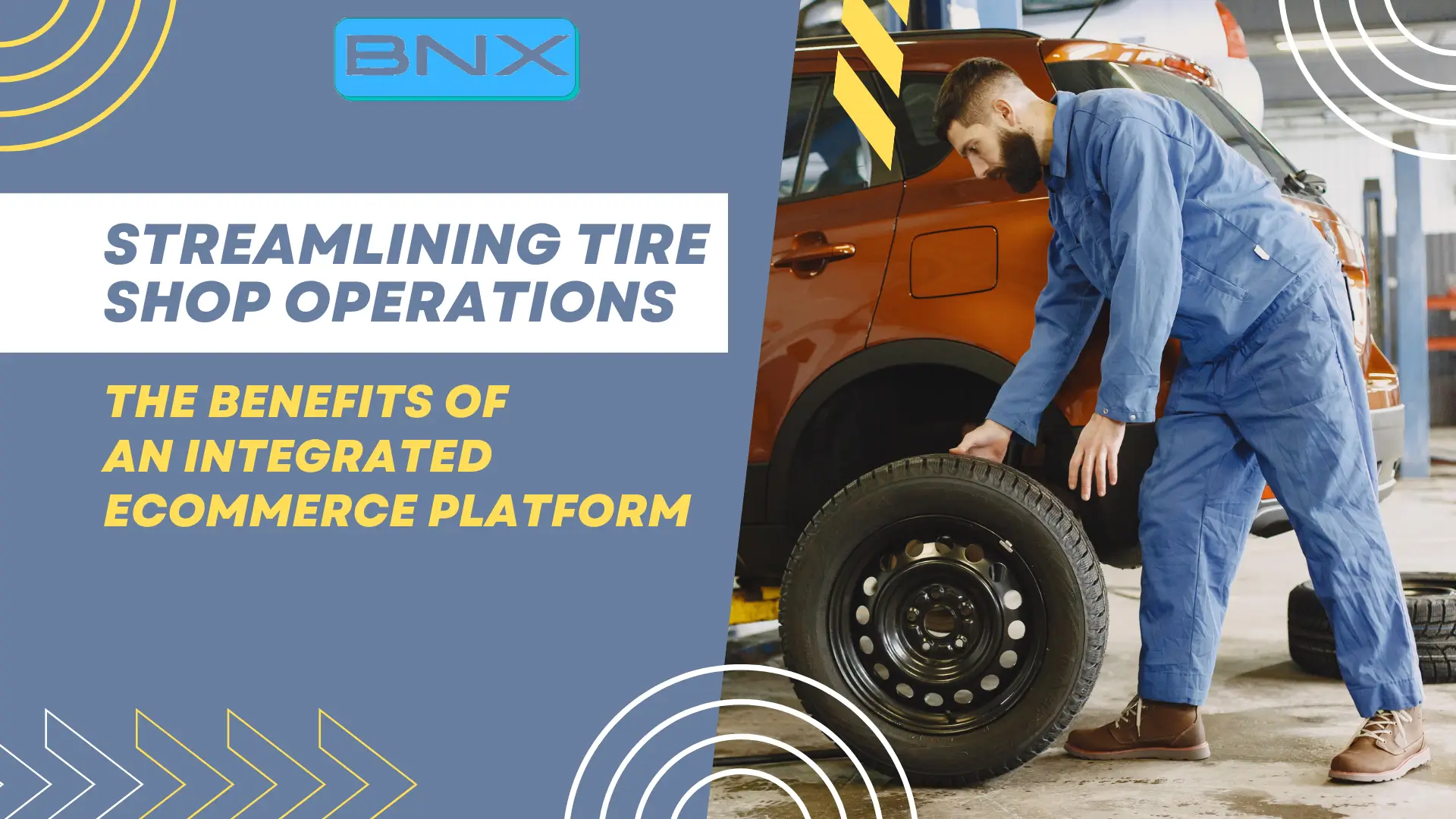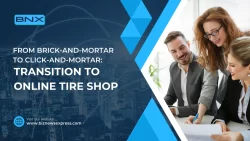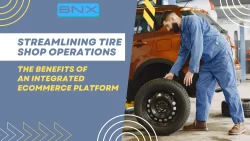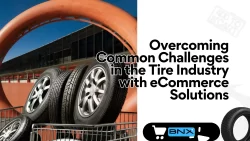Streamlining Tire Shop Operations: The Benefits of an Integrated eCommerce Platform

In the dynamic landscape of tire retail, streamlining tire shop operations is crucial for staying competitive. Tire shops are given new chances to improve customer satisfaction and optimize operations as technology advances. We’ll explore how this technology may completely transform your business, from making inventory management easier to reaching a wider audience of potential customers.
Common Challenges Faced by Tire Shop Owners in Streamlining Tire Shop Operations
Inventory Management
One of the most faced tire shop operational challenges is maintaining tire inventories. While underordering might result in stockouts and lost sales, overordering can drive up storage expenses. Proper working conditions should be maintained.
How to Overcome:
Advanced inventory management technologies that automate tracking and stock level updates are included into eCommerce platforms. Tire store operators may prevent stockouts and overstocking by using these solutions, which offer real-time inventory information. Accurate planning and inventory ordering are made easier by the platforms’ ability to forecast demand trends based on historical data.
Customer Relationship Management
Strong client connections are necessary for recurring business, but they can be difficult to establish and maintain without the correct resources. To prevent customer dissatisfaction and lost revenue, an effective system is needed to keep track of consumer preferences, service histories, and communication.
How to Overcome:
This tire industry challenge can be resolved by integrating robust CRM features into eCommerce platforms to facilitate efficient management of client interactions and preferences. These technologies enable individualized marketing and communication by storing comprehensive consumer histories, including previous purchases and service information. Customer satisfaction and loyalty can be increased by easily managing targeted promotions, loyalty programs, and automated follow-ups.
If You are looking for Ready to Use eCommerce Solutions for Tire Industry, please fill the form below for Demo:
Efficient Scheduling and Staffing
Keeping track of appointments and making sure your store has enough employees is one of the most reported tire shop operational challenges by shop owners. Client satisfaction and operational efficiency can be negatively impacted by inefficient scheduling, which can result in overbooked time slots, lengthy client wait times, and underutilized staff.
How to Overcome:
The appointment scheduling process is made easier by the integrated capabilities that many custom eCommerce solutions offer. Consumers can use the system to automatically update the shop’s calendar when they schedule services online at their convenience. Automatic reminders lower the number of no-shows, guaranteeing efficient operations and improved client support.
Data Accuracy and Reporting
Reliable information is essential for well-informed corporate decision-making. Errors resulting from manual data entry might affect customer information, financial records, and inventory levels. Also, it can be difficult to generate correct reports without trustworthy data to comprehend sales trends, operational efficiency, and business performance.
How to Overcome:
The risk of human error is greatly decreased by the automation of data entry and administration provided by custom eCommerce solutions. They offer thorough reporting and analytics capabilities that provide insights into different facets of the company. Tire store managers may create precise statistics on sales, inventory, and consumer behavior, which helps with strategic planning and well-informed decision-making.
Real-World Success Stories of Tire Shops Embracing eCommerce
#1. Tire Rack
Tire Rack stands as one of the top tire online merchants in the US. They were among the first in the industry to switch to an eCommerce platform.
Success Factors:
- Extensive Online Catalog: Tire Rack provides a wide selection of tires and related goods that are simply searchable by brand, vehicle type, and performance requirements.
- Virtual Tire Selector: With the help of their creative Tire Decision Guide, clients may choose the ideal tires for their needs and tastes.
- Effective Logistics: Tire Rack has built a strong distribution network to guarantee prompt and dependable product delivery.
#2. SimpleTire
Thousands of independent tire fitters around the US are partners with SimpleTire, an online tire reseller. Their business strategy is centered on using eCommerce to streamline the tire purchasing process.
Success Factors:
- Nationwide Installer Network: SimpleTire provides convenient installation choices by connecting clients with a large network of nearby installers.
- User-Friendly Website: Customers can easily search and buy tires on this platform because of its straightforward design.
- Flexible Shipping Options: Consumers can have tires delivered to their residences directly or via a nearby installer.
What are the Benefits of Using Tire Shop Management Software?
Streamlined Inventory System
Tire shop management software revolutionizes the way you handle inventory. You can keep an eye on stock levels in real-time with automated tracking, so you’ll never run out of necessities. This approach minimizes human mistakes and reduces the time needed for manual inventory checks. You can avoid overstocking, make wise purchases, and effectively manage storage space if you have a comprehensive picture of your inventory.
Customer Relationship Management
Strong customer relationships must be established and maintained, and this requires a reliable CRM system. A CRM section in tire shop management software usually allows you to keep track of client interactions, preferences, and past purchases. Personalized service is made possible by this data, which increases client loyalty. For greater customer satisfaction, you can offer customized promos, follow-up messages, and reminders for tire rotations or replacements.
Access to Customer and Vehicle History
It can be helpful to have instant access to comprehensive customer and car history. Software for managing tire shops keeps track of all pertinent data, including vehicle information, tire purchases, and previous services. You can provide better service and more knowledgeable recommendations thanks to this thorough background.
Efficient Appointment Scheduling
Scheduling appointments manually can be laborious and error-prone. With its effective capabilities for scheduling appointments, tire shop management software streamlines this process. Online service bookings are accepted from clients, and the system instantly updates your calendar to avoid duplicate reservations and guarantee efficient use of available resources. Notifications and reminders keep your shop operating efficiently and help cut down on no-shows.
Enhanced Data Accuracy
Errors can occur when entering data manually, which might result in expensive blunders. Data accuracy is improved by tire shop management software, which automates data entering procedures. The program makes sure that all data is correct and current, whether it is logging customer information, registering sales, or updating inventory levels. Making wise company decisions, upholding compliance, and offering top-notch customer service all depend on this dependability.
Step-by-Step Implementation of an eCommerce Solution
Assessment and Planning
Start by evaluating your present business procedures and determining your unique eCommerce requirements and goals. Establish your target market, the things you wish to offer online, and the amount of money you must put the eCommerce solution into place. Make a thorough strategy that outlines the steps, resources, and schedule needed to complete the implementation process.
Choose the Right eCommerce Platform
Choose an eCommerce platform that best fits your needs as a business and your budget by doing some research. Consider elements like usability, adaptability, scalability, eCommerce features of tire shops, and compatibility with other corporate systems. BigCommerce, WooCommerce, Magento, and Shopify are a few well-known eCommerce platforms.
Setup and Customization
Start configuring your online store as soon as you’ve selected your eCommerce platform. Make sure that the colors, logos, and graphics in the design and layout accurately represent your brand identity. Create product categories, add listings with thorough details and photos, and adjust the cost, mode of delivery, and payment methods to suit your company’s requirements.
Integration and Testing
To improve customer experience and optimize operations, incorporate necessary features and functionalities into your eCommerce platform. Integration of payment gateways, shipping companies, inventory control systems, and CRM software are a few examples of this. Make sure everything is working properly by thoroughly testing your online business, including order fulfillment, payment processing, browsing, and shopping cart functionality.
Launch and Promotion
Launch your online store and start promoting it to your target market as soon as your eCommerce platform is configured and tested. To increase website traffic and revenue, make use of a variety of marketing platforms, including social media, email marketing, SEO, and online advertising. To maximize your eCommerce strategy and accomplish your company objectives, keep an eye on your store’s performance, measure important data, and make necessary adjustments.
Final Thoughts
There are several benefits to integrating an eCommerce platform for streamlining tire shop operations, and they can help you grow your company to new heights. You may position your tire business for long-term success by improving the whole shopping experience, growing your customer base, and optimizing inventory management. Maintaining competitiveness requires embracing technology and adjusting for shifting customer demands.






